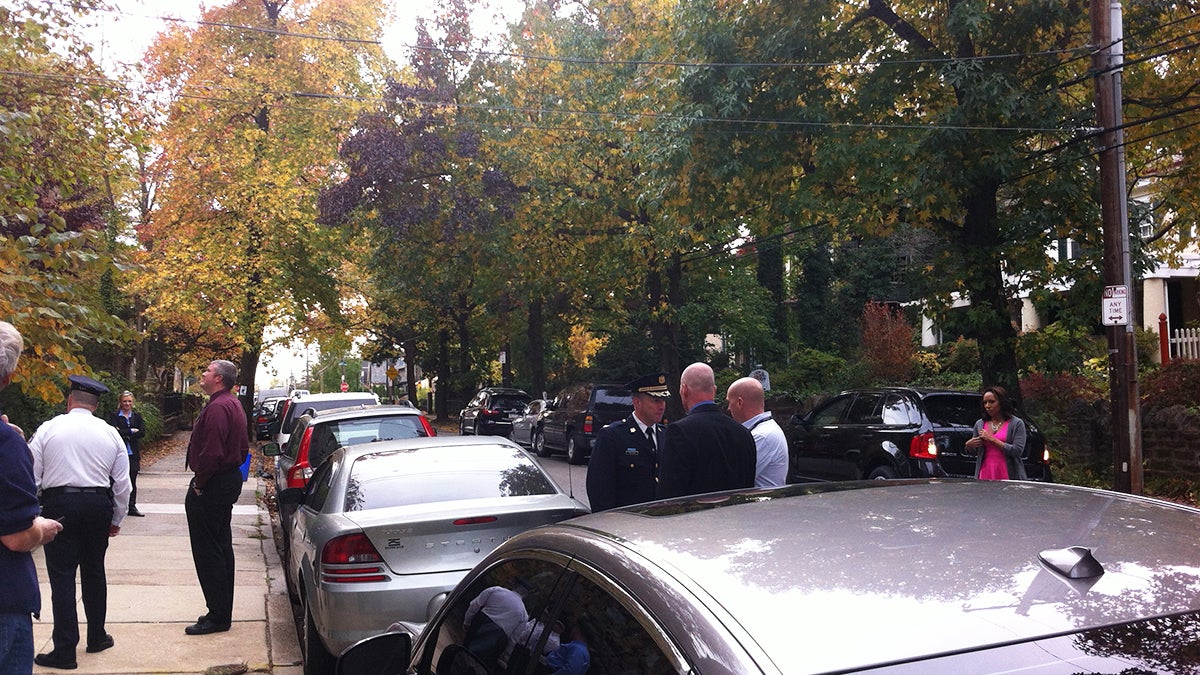Miracle of the midterms: The return of Carlesha Gaither

Philadelphia police brass and national media at the scene of the Carlesha Freeland-Gaither kidnapping on Tuesday, Nov. 4 (Solomon Jones / for Newsworks)
“I feel numb. I feel disgusted. I feel devastated.”
That’s what Keisha Gaither told me in an interview on 900 AM WURD, last Wednesday, just hours before police received a break in the brutal kidnapping of her daughter, 22-year-old Carlesha Freeland-Gaither.
The video of the abduction, which was caught on a surveillance camera at Coulter and Greene streets in Germantown, was especially painful for Keisha because, like all of us, she saw it on television repeatedly.
“Seeing that over and over and over every time you turn on the TV … the more they play that, the more it’s like they’re taking life out of me,” Gaither told me. “I’m already empty because I don’t have my child. But to just keep watching him do this … it just hurts a lot to see it.”
She wasn’t alone
It was a hurt that stretched across the black community and the community at-large. It overshadowed consternation over the new Republican Senate majority and its potential impact on President Obama.
It outstripped the joy many of us felt after rejecting Gov. Tom Corbett’s education cuts and prison expansions in favor of Tom Wolf.
The hurt was all-consuming. But then, a miracle happened.
Carlesha Freeland-Gaithers was found three days after she was allegedly abducted by 37-year-old Delvin Barnes.
This happened after I asked Carlesha’s mother to explain what she wanted us to know about her daughter. She delivered an impassioned plea.
“I want the world to know that my daughter was a good and beautiful person,” she said. “I want them to know that she wasn’t coming from a party. I want them to know that she went to go see her godson. I want them to know these things.
“Just bring her home to me. That’s all. I just want them to bring her home safe and sound. Do not harm my baby. Just bring her home. Just bring her back.”
The discovery
Less than 12 hours after Keisha Gaither uttered those words, Carlesha Freeland Gaither was found in Maryland, and she was alive.
Investigators rightly credited their own hard work, and the assistance of technology, which allowed them to track the suspect from Philadelphia to Maryland with cameras and a GPS system that was placed on his car by a dealer.
Keisha Gaither properly thanked the detective who promised to bring her baby home.
Philadelphia Police Commissioner Charles Ramsey was correct when he credited the public for the leads they provided.
But here’s what all of us — from the police, to the public, to Carlesha’s family — understood: Finding Carlesha alive after three days was a minor miracle, because in abduction cases, time is of the essence. The more time passes, the less likely the victim will be found alive.
Keisha Gaither knew that, and that’s why she gave the answer she did when I asked her to tell me what the community could do to help.
“I couldn’t ask for anything more,” she said. “They’re reaching out to me … America is reaching out to me. Prayers, we couldn’t ask you guys for anything more … the prayers are unbelievable.”
Perhaps that is the message we are meant to take from Carlesha Freeland-Gaithers’ horrifying ordeal: That after all the searching, all the video, all the tracking, and the tireless police work, the most valuable thing we have to give to one another in moments of extreme stress is hope.
That’s what prayers represent, after all — our most sacred hope that there is something bigger than the last election, or the next governor, or the Senate majority.
Hope is what emerged when we learned that Carlesha Freeland-Gaither was found alive in Maryland, that she was reunited with her family and that her life would resume.
Hope told us that and all the things we thought were so important don’t matter quite as much when we measure them against the lives of our loved ones.
Hope is what kept us believing that Carlesha’s story could have a happy ending.
Hope is what kept us praying, and as we learned from Carlesha’s unfathomable story, prayer works.
Listen to Solomon Jones Monday – Friday from 7 to 10 am on 900 am WURD.
WHYY is your source for fact-based, in-depth journalism and information. As a nonprofit organization, we rely on financial support from readers like you. Please give today.


